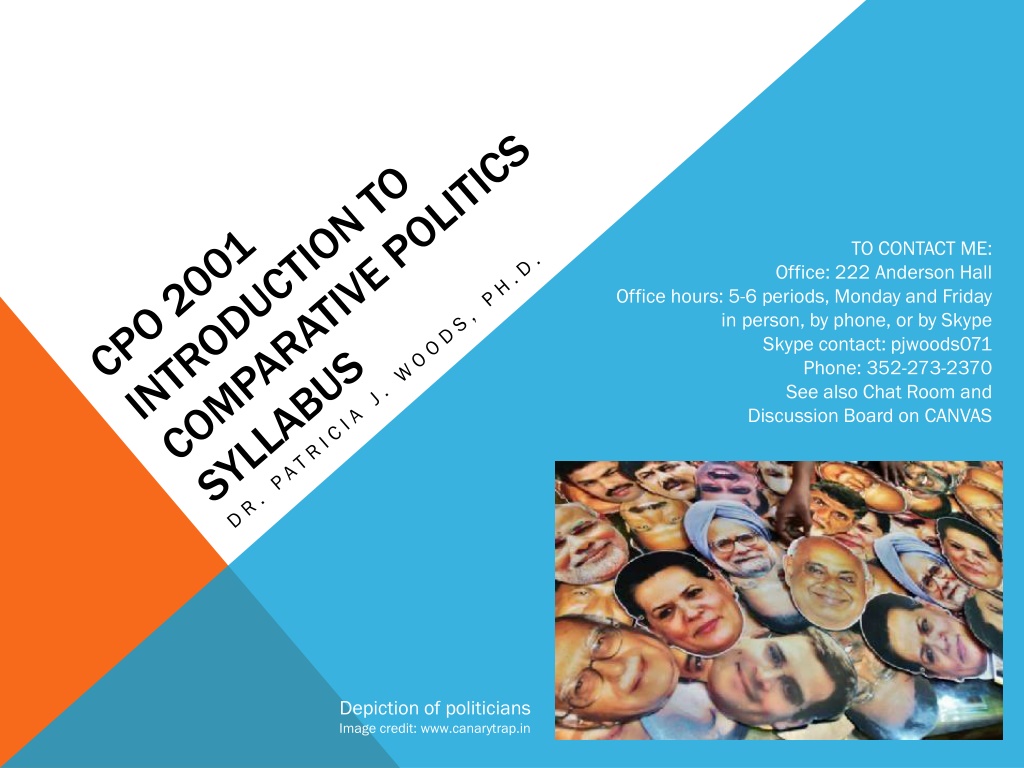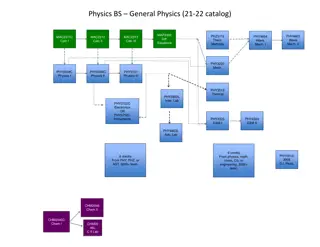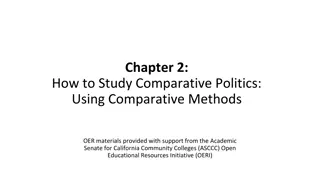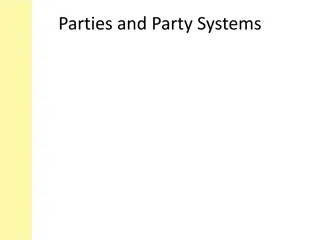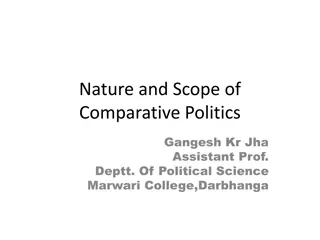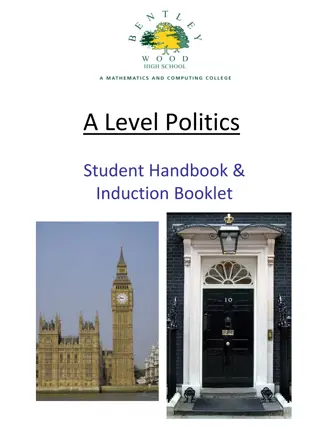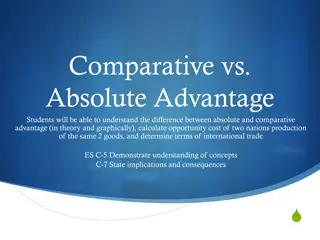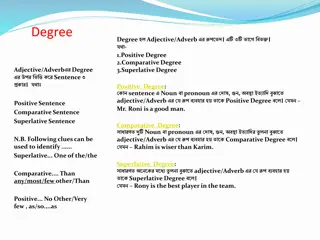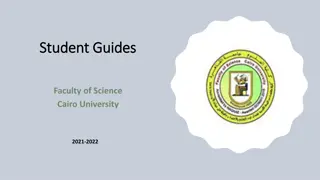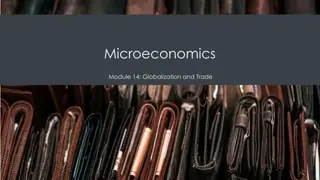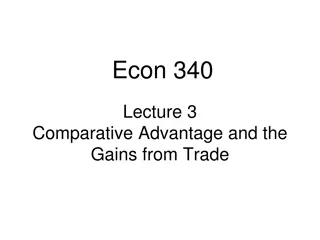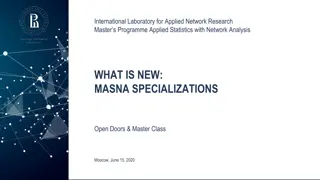Understanding Comparative Politics: Field Overview and Specializations
Comparative politics involves studying domestic politics across different states and nations, with a focus on comparison and analysis. The field distinguishes itself from American Politics, International Relations, and Foreign Policy, emphasizing an in-depth look at state-society dynamics within specified regions of the world. Scholars typically specialize in regions such as Europe, Africa, Latin America, the Middle East, South Asia, Southeast Asia, China, or Russia.
Download Presentation

Please find below an Image/Link to download the presentation.
The content on the website is provided AS IS for your information and personal use only. It may not be sold, licensed, or shared on other websites without obtaining consent from the author. Download presentation by click this link. If you encounter any issues during the download, it is possible that the publisher has removed the file from their server.
E N D
Presentation Transcript
TO CONTACT ME: Office: 222 Anderson Hall Office hours: 5-6 periods, Monday and Friday in person, by phone, or by Skype Skype contact: pjwoods071 Phone: 352-273-2370 See also Chat Room and Discussion Board on CANVAS Depiction of politicians Image credit: www.canarytrap.in
EXPLANATION OF THE FIELD OF COMPARATIVE EXPLANATION OF THE FIELD OF COMPARATIVE POLITICS (COURSE DESCRIPTION) POLITICS (COURSE DESCRIPTION) Comparative politics is the study of domestic politics of states and nations around the world. It often includes an explicit dimension of comparison, although not always. When it includes a comparative dimension, comparison may be across countries, themes within comparative politics, or across time. There is often, although not always, a historical dimension to the study of comparative politics. Comparative politics took its name to distinguish itself from the study of American Politics, International Relations, or Foreign Policy. Comparative politics, at the most basic level, means the study of domestic politics of states and nations outside the United States (therefore to be distinguished from the study of American Politics). More recently, some scholars of comparative politics use the tools of comparative politics to include the U.S. in their studies to a lesser degree in some way. We try to be very careful, when we do so, to stick closely to the theme or comparative research tool at hand, since we are not specialists in American Politics. Left: Migrant workers in the U.K. (England). Image credit: dailymail.uk.com Right: India s independence day, August 2013, with a Bollywood actress, Vidya Balan, and parade in New York City. Image credit: Peter J. Smith, Wall Street Journal
EXPLANATION OF THE FIELD OF COMPARATIVE POLITICS Comparative politics is different from International Relations in that the latter tends to study international institutions, relations between elite levels of states, and international themes that find themselves within this elite level, including international political economy, international law, etc. And, finally, comparative politics is different from the study of foreign policy in that we tend to study our regions of the world from the inside-out rather than from the outside-in. That is, we do not look at Europe, Asia, Africa, the Middle East, or Latin America from an American vantage point. That is the job of scholars of American politics, or American foreign policy, as usually conceived by comparative political scientists. Our job, as we see it, most typically, is to explain the internal workings of states, politics, and state- society dynamics (including grassroots dynamics) from inside our regions of specialization. Image credit: mapsnworld.com That does not necessarily mean we are scholars who are insiders to the region on which we are specialists. Most often, comparative political scientists are not from the regions that we study; nonetheless, we study them from the inside-out rather than from an American perspective-in. This can take some getting used to when you are first introduced to the field of study that we call comparative politics.
THE FIELD OF COMPARATIVE POLITICS As you can see from this discussion already, most scholars of comparative politics specialize in one region of the world. These are usually defined as: Europe; Africa; Latin America; the Middle East/MENA Region (Middle East and North Africa); South Asia; Southeast Asia; China; or Russia/former-Soviet Union/former-Soviet Bloc. Comparative political scientists are expected to spend a significant amount of time usually years living in the region on which they are specialists so that they have significant lived experience in the region. This often means difficult living conditions over long periods of time, doing without what many Americans consider to be necessities, such as electricity, running water, air conditioning, or television. In addition to that, years spent living in their region of specialty usually include significant time in government archives, interviewing local social and political actors, and observing the political system directly. It has been emphasized many times by scholars of comparative politics that formal rules what is written on the books in constitutions, laws, and the like can sometimes be very different from how a political system functions on the ground in practice. Comparativists, as we call scholars of comparative political science, must spend significant time living in a region, thus, to be able to distinguish between theory and practice, as well as to understand the local context, as best we can, from the inside-out. My house, Jacmel, Haiti, 1977. My house, Jacmel, Haiti, 1977. Image credit: Charles A. Woods
PERSPECTIVE All of this is the perspective that comparative politics has to offer, and it is a different perspective than those offered by the other major fields of study within political science already mentioned.
PERSPECTIVE Take a moment to study this worldmap upside down. Really study it. Where are countries located that you are used to finding easily? How do continents look in relation to one another? Why do this? It is not to irritate your senses, I promise!
PERSPECTIVE We are used to seeing the world from the vantage point of sitting in North America. Not only that, but we see the world from the central part of North America, south of Canada and North of Mexico. For us, the world most typically looks like this. When we look at a map, we most typically imagine it from us (the U.S.)-out: Image credit: gabelli- us.com maps We are comfortable with this view of the world. It feels most natural to us, if only because of where we sit and wake up every morning on the globe.
PERSPECTIVE Below: If you live in Australia, Chile, South Africa, Madagascar, or New Zealand, this is how the world looks to you every day when you wake up, as a natural outcome of living on that location on the globe. In fact, south of the equator, in the entire part of the globe you can see on this map, hurricanes spin in the opposite direction as what we are used to (clockwise in the southern hemisphere). Even physics (not only social perspectives) can be different if you live in different parts of the globe. Image credit: worldatlas.com Above: If you live in Alaska, or in Japan, or in Norway, Finland, Sweden, Russia, Iceland, etc., the world looks more like this. This is how you see the world every day when you wake up in the morning, as a natural outcome of living in that location on the globe. I was born in Fairbanks, AK and have friends in Scandinavia; I can assure you this is true! Image credit: worldatlas.com
PERSPECTIVE MATTERS Perspective matters. Different perspectives are a natural outcome, often, of different contexts, be they geographical (as just discussed), economic, social, gender-related, norms-related, power-related, etc. It is the job of Comparative Politics to explain what domestic politics looks like from the inside-out, from the top-down, and from the bottom-up in various national contexts. This is what we do. So, you will not often hear me speak about the world in lectures from an American-centric position. This does not reflect antipathy for the U.S. I love the U.S. and have chosen to make my life here. I have lived many places and could have made my life in a number of different countries. I will explain domestic politics as much as possible from the inside-out to local contexts because it helps us to better understand how politics really works around the world. It is the job of other political scientists, policy scholars, Americanist historians and others to analyze American politics, or politics from a U.S. perspective. You will not find that in this course. If that will bother you, please choose another course. The Atlas Mountains, Morocco (Northwest Africa). The Atlas Mountains, Morocco (Northwest Africa). Rural/urban, mountain/valley, land/sea, nomadic/settled, military/civilian, etc. there are many types of vantage points or perspectives that still affect our views of one another significantly enough that they can and do affect politics in very critical ways. Image credit: http://wtlab.iis.u- tokyo.ac.jp/~wataru/lecture/rst/Sect2/Sect2_6.html
GRADE DISTRIBUTION You can follow your grades through the Grades tab on CANVAS.
UNIVERSITY & COURSE POLICIES Attendance & makeup policy: Requirements for class attendance and make-up exams, assignments, and other work in this course are consistent with university policies that can be found in the online catalog at: https://catalog.ufl.edu/ugrad/current/regulations/info/attendance.aspx. You are not required to attend any class room lectures or real-time discussions for this course. The entire course is web-based and is non-synchronous. All assignments fall under this policy as well as the student honor code. Late Policy: NA Since you have no class room meetings for this class, tardiness is not an issue. Cell phone and texting policy: NA This should not be relevant for this web-based course. Grade Disputes: Should a student wish to dispute any grade received in this class (other than simple addition errors, for which you should contact the instructor), the dispute must be in writing and be submitted to the instructor within a week of receiving the grade. The dispute should set out very clearly, the grade that the student believes the assignment should have received as well as why he or she believes that he or she should have received such a grade.
UNIVERSITY & COURSE POLICIES (CONTINUED) Academic Honesty: UF students are bound by The Honor Pledge which states, We, the members of the University of Florida community, pledge to hold ourselves and our peers to the highest standards of honor and integrity by abiding by the Honor Code. On all work submitted for credit by students at the University of Florida, the following pledge is either required or implied: On my honor, I have neither given nor received unauthorized aid in doing this assignment. The Honor Code (http://www.dso.ufl.edu/sccr/process/student-conduct- honorcode/) specifies a number of behaviors that are in violation of this code and the possible sanctions. Furthermore, you are obligated to report any condition that facilitates academic misconduct to appropriate personnel. If you have any questions or concerns, please consult with the instructor or TAs in this class. Accommodations for Students with Disabilities: Students requesting classroom accommodation must first register with the Dean of Students Office. The Dean of Students Office will provide documentation to the student who must then provide this documentation to the Instructor when requesting accommodation. Contact the Disability Resources Center (http://www.dso.ufl.edu/drc/) for information about available resources for students with disabilities. Counseling and Mental Health Resources: Students facing difficulties completing the course or who are in need of counseling or urgent help should call the on-campus Counseling and Wellness Center (352-392-1575; http://www.counseling.ufl.edu/cwc/). Online Course Evaluation Process: Students are expected to provide feedback on the quality of instruction in this course based on 10 criteria. These evaluations are conducted online at https://evaluations.ufl.edu. Evaluations are typically open during the last two or three weeks of the semester, but students will be given specific times when they are open. Summary results of these assessments are available to students at https://evaluations.ufl.edu/results.
LEARNING GOALS AND STUDENT EVALUATIONS When it comes time to do student evaluations of this course, please look at the Learning Goals of the course and of each Module. Please evaluate the course based upon what you learned what you learned. Student evaluations will be conducted at the end of the course at: www.evaluations.ufl.edu. Please remember to submit one for this course! If you liked the course, it also helps to let students know about the course on www. ratemyprofessors.com.
ABOUT THIS COURSE / ASSIGNMENTS 1. 1. Readings and Module Evaluations Readings and Module Evaluations Your work in this course will be centered on reading. There will be 6 modules for this course. At the end of each module, you will be asked to take what is called a low stakes Module Evaluation based upon the reading, lectures, and lecture slides for that module. Questions on each Module Evaluation will help you to study for the Exams. Please treat Module Evaluations as quizzes. You will be given 15 questions. You will have three chances to take the evaluation. Your highest grade will be recorded in your Gradebook. Module Evaluations are open book and open note. They are, however, timed. You will have 30 minutes for each try. Questions may change somewhat each try you make on the Module Evaluation. You may take the Module Evaluations in any order, but it is highly recommended for most students that you do the work in the module order given, as it builds upon itself over the course of the semester. All Module Evaluations must be completed before Finals Week. All Module Evaluations will be closed 11:00 p.m. Friday of the last week of classes. will be closed 11:00 p.m. Friday of the last week of classes. Note: Ideally, you should aim to complete one Module every two weeks, and you should begin work on your Group Project by Week 3. All Module Evaluations
ABOUT THIS COURSE / ASSIGNMENTS Readings and Module Evaluations (continued) Readings and Module Evaluations (continued) You may not consult with other students about the Module Evaluations; given the time dimension to the quiz, you will find that such consultation is not cost-effective. If you are found to engage in such consultation with other students regarding Module Evaluations (cheating), you will receive a failing grade for the COURSE. Don t risk it. Do your own work. Spend your energy that way. You will learn the best that way! Please do not consult external resources to help understand the readings. You will have lectures and enough readings as it is. External sources may have a different way of understanding the readings or issues in this course, so they may hurt more than help in any case.
ABOUT THIS COURSE / ASSIGNMENTS 2. 2. Exams Exams You will have two exams in this course. Exam I will include 35 questions. Exam II will have 40 questions. Some questions will be taken from your Module Evaluation questions. Exams will be multiple-choice, true/false, and matching. Questions will center on the readings and lectures. You will get two chances to take each exam. As with the Module Evaluations, Exams are open book and open note. They are, however, timed. You will get 60 minutes for each try for Exam I, and 70 minutes for each try for Exam II. The questions may change somewhat each try you make on the exam. Exam I should be taken when you have completed Modules 1, 2, and 3. Exam II should be taken when you have completed Modules 4, 5, and 6. Exam II must be taken, at the latest, Wednesday of Finals Week by 11 p.m. Exam II will be must be taken, at the latest, Wednesday of Finals Week by 11 p.m. Exam II will be closed at 11 p.m. on Wednesday of Finals Week. closed at 11 p.m. on Wednesday of Finals Week. Exam II
ABOUT THIS COURSE / ASSIGNMENTS Exams (continued) Exams (continued) You may not consult with other students about the Exams. Given the time dimension to the Exams, you will find that such consultation is not cost-effective. If you are found to engage in such consultation with other students regarding Exams (cheating), you will receive a failing grade for the COURSE. Don t risk it. Do your own work. Spend your energy that way. You will learn the best that way! Please do not consult external resources to help understand the readings. You will have lectures and enough readings as it is. External sources may have a different way of understanding the readings or issues in this course, so they may hurt more than help in any case.
ABOUT THIS COURSE / ASSIGNMENTS 3. 3. Final Final Group Group Project Project You will each be assigned to a group of ten students. Each group will be assigned either to a REGION of the world, or to a THEME in comparative politics. You will be asked to communicate with your group on Voice Thread. Sub-groups of two to three students will work together closely on their project throughout the semester. The entire group will communicate as well to lend coherence to the overall project. Everyone will be assigned to create a 6 minute video with lecture, or moving slide show with lecture. All videos/moving slide shows with lectures will be uploaded to Voice Thread for your final group project. Completed Group Projects Completed Group Projects are due on Monday of Finals Week by 11 p.m. are due on Monday of Finals Week by 11 p.m. Some will be assigned to make an individual video/slide show themselves; others will make a single one through the joint work of one sub-group. Look over the assignment and think about how you prefer to work. Both have up-sides and down-sides. Either way you have to work with your sub-group, but group videos/slide shows are more group-involved. Please see GROUP PROJECT page for more details. Group Projects should be begun in earnest by Week 3.
CONTACT TO CONTACT ME: Office: 222 Anderson Hall Office hours: 5-6 periods, Monday and Friday in person, by phone, or by Skype Skype contact: pjwoods071 Phone: 352-273-2370 See also Chat Room and Discussion Board on CANVAS Please use Discussions tab for substantive comments and questions about readings. You can also use them to discuss optional materials, such as films, study questions, extra readings, and extra video links. You can use them to discuss these things among yourselves, or with me. I will check Discussion board ever few days (not every day). Please use Chat for troubleshooting questions among yourselves or for me. I will check the Chat room every few days (not every day). Please do make sure to contact me if you have a question. Please don t say later that you couldn t get an answer if you don t call, post on the Chat room or Discussion board, etc. Other students may need an answer to your question as well, so do ask if you have a question! Don t just sit with it!
REQUIRED TEXTS 1. The Oxford Handbook of Comparative Politics, edited by Carles Boix and Susan C. Stokes. Oxford University Press, 2009. 2. Benedict Anderson, Imagined Communities. New York: Verso Press, 2006. 3. Additional required articles or chapters, as well as a collection of extra sources will be available on e-reserves on the University of Florida Smathers Library website. To Get Your Text and Other Readings: Texts have been put on UF Textbook Adoptions. They should be available in bookstores around town. You are responsible to have the texts. Please order them on-line if you have trouble finding them otherwise. If you are not in Gainesville, you will need to order the texts yourselves (amazon.com, barnesandnoble.com, and bookdfinder.com are all good resources for this); and you will need to access the Smathers Library E-Reserves website remotely.
MODULE SCHEDULE This course is non-synchronous. That means that you can do your module assignments at any time. The readings you are being asked to do are very dense. Please use this non- synchronous approach to get ahead on the readings rather than waiting to the last minute. You have SIX MODULES with approximately 7 readings per module. Waiting simply will not work, as there is a lot of reading for this course, and I prefer you to get great grades rather than failing the course. Please be advised, you are being treated as adults and budding scholars who can schedule your own time. That being said, students who do the work for this course have reported thinking of things they have never thought of before, reading faster, finding arguments in readings that they didn t know were there before, and learning a tremendous amount about comparative politics. You will enjoy this course if you choose to do the work, and if you are interested in the politics of countries around the world. Please make sure to look Please make sure to look now (below). Some Modules have five readings, others have seven, (below). Some Modules have five readings, others have seven, one has a book and two articles. All include lectures, video links, one has a book and two articles. All include lectures, video links, now over the entire Module Schedule over the entire Module Schedule etc. etc.
MODULE ONE The Origins of States and Capitalism in Europe The Origins of States and Capitalism in Europe Readings 1. Boix and Stokes, The Oxford Handbook of Comparative Politics. Chapter: Boix and Stokes, Introduction Max Weber, Chapter 4, The Religious Foundations of Worldly Asceticism, Parts A and B (Calvinism and Pietism) in The Protestant Ethic and the Spirit of Capitalism. New York: Dover, 2003. Max Weber, Chapter XI, Bureaucracy in Economy and Society Volume II. Berkeley, CA: University of California Press, 1978. E.P. Thompson, Introduction: The Black Act, in E.P. Thompson, Whigs and Hunters: The Origin of the Black Act. New York: Pantheon Books, 1975 (pps. 27-54). E.P. Thompson, Chapter 2, Christian and Apollon in The Making of the English Working Class. London: Victor Gollancz Ltd., 1963. 2. 3. 4. 5. See Modules tab for links to my lectures and video tours (required), as well as extra resources, optional study questions to help you with the readings, etc.
MODULE TWO Bureaucratization, Centralization of the State, and Revolution in Europe Bureaucratization, Centralization of the State, and Revolution in Europe Readings 1. Boix and Stokes, eds., The Oxford Handbook of Comparative Politics. Chapter: Hendrik Spruyt, War, Trade, and State Formation 2. Michael Mann, Chapter 14, The Rise of the Modern State: The Expansion of the Civilian Scope in The Sources of Social Power. Cambridge: Cambridge University Press, 1993. 3. James Scott, Chapter 1, Nature and Space in Seeing Like A State. New Haven: Yale University Press, 1999. 4. Theda Skocpol, Chapter 5, The Birth of a Modern State Edifice in France in States and Social Revolutions. Cambridge: Cambridge University Press, 1979. 5. Eric Hobsbawm, Chapter 1, The Springtime of the Peoples, in The Age of Capital, 1848- 1875. New York: Vintage, 1996. See Modules tab for links to my lectures and video tours (required), as well as extra resources, optional study questions to help you with the readings, etc.
MODULE THREE Theory and Method in Comparative Politics Theory and Method in Comparative Politics Readings 1. Boix and Stokes, eds., The Oxford Handbook of Comparative Politics. Chapters: Historical Enquiry and Comparative Politics by James Mahoney and Celso M. Villegas The Case Study: What It Is and What It Does by John Gerring Field Research by Elisabeth Jean Wood Collective Action Theory by Elinor Ostrom 2. Emile Durkheim, Chapter 2, Mechanical Solidarity, or Solidarity by Similarities in The Division of Labor in Society. New York: Free Press, 2014. 3. Emile Durkheim, Chapter 1, What Is a Social Fact? in The Rules of Sociological Method. Edited with new introduction by Steven Lukes. New York: Free Press, 2013. 4. Clifford Geertz, Chapter 8, Ideology As A Cultural System in The Interpretation of Cultures: Selected Essays. New York: Basic Books, 1973.
MODULE FOUR Ethnicity Ethnicity and Nationalism and Nationalism Readings 1. Benedict Anderson, Imagined Communities. London and New York: Verso, 2006 (whole book). 2. Boix and Stokes, The Oxford Handbook of Comparative Politics. Chapters: Ashutosh Varshney, Ethnicity and Ethnic Conflict Russell Hardin, Compliance, Consent, and Legitimacy
MODULE FIVE Authoritarianism and Clientelistic Rule Authoritarianism and Clientelistic Rule Readings 1. Scott Radnitz, Chapter One from: Weapons of the Wealthy: Predatory Regimes and Elite-Led Protests in Central Asia. Ithaca, NY: Cornell University Press, 2010. 2. H.E. Chehabi and Juan J. Linz, A Theory of Sultanistism: A Type of Nondemocratic Rule in Sultanistic Regimes, edited by H.E. Chehabi and Juan J. Linz. 3. Boix and Stokes, The Oxford Handbook of Comparative Politics. Chapters: Democracy and Civic Culture by Filippo Sabetti What Causes Democratizaton? by Barbara Geddes Political Clientelism by Susan C. Stokes Parties and Voters in Emerging Democracies by Frances Hagopian
MODULE SIX Comparative Judicial Politics Comparative Judicial Politics Readings 1. Tamir Moustafa, Chapter one from: The Struggle for Constitutional Power: Law, Politics, and Economic Development in Egypt. New York: Cambridge University Press, 2007. Patricia J. Woods, Chapter one from: Judicial Power and National Politics: Courts and Gender in the Religious-Secular Conflict in Israel. New York: State University of New York Press, 2008. Lisa Hilbink, Chapter one from: Judges beyond Politics in Democracy and Dictatorship: Lessons from Chile. New York: Cambridge University Press, 2011. Carlos Guarnieri and Patrizia Pederzoli, Introduction to The Power of Judges: A Comparative Study of Courts and Democracy. London: Oxford University Press, 2002. Susan Thomson and Rosemary Nagy, Law, Power and Justice: What Legalism Fails to Address in the Functioning of Rwanda s Gacaca Courts in International Journal of Transitional Justice 5:1 (2011): 11-30. Boix and Stokes, The Oxford Handbook of Comparative Politics. Chapters: Comparative Judicial Politics by John Ferejohn, Frances Rosenbluth, and Charles R. Shipan Separation of Powers by David Samuels 2. 3. 4. 5. 6.
